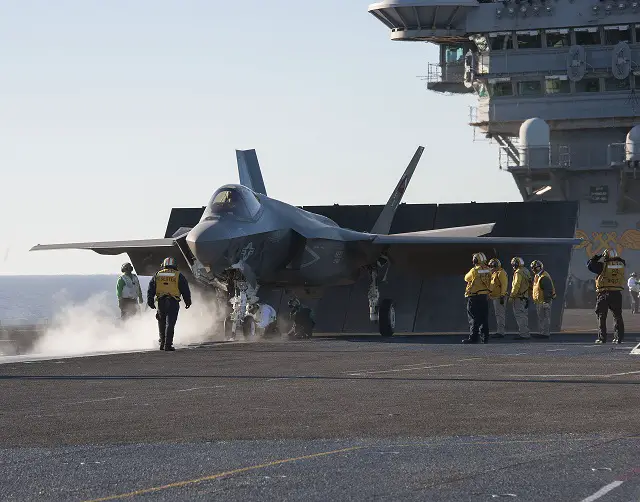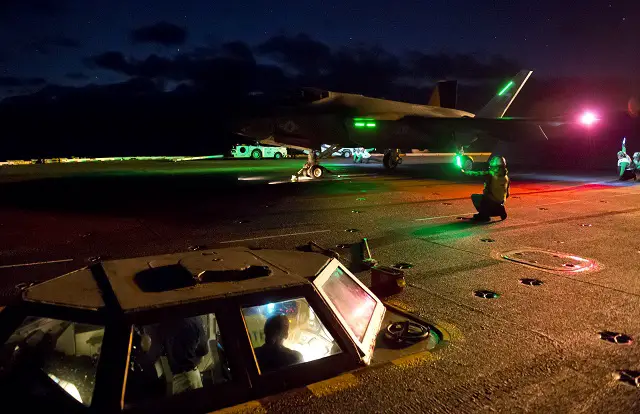Breaking news
F-35C Lightning II Completes initial sea trials aboard the aircraft carrier USS Nimitz (CVN 68).
| 2014
 PACIFIC OCEAN (Nov. 4, 2014) An F-35C Lightning II carrier variant joint
strike fighters conducts the first catapult launches aboard the aircraft
carrier USS Nimitz (CVN 68). The F-35 Lightning II Pax River Integrated
Test Force from Air Test and Evaluation Squadron (VX) 23 is conducting
initial at-sea trials aboard Nimitz. (U.S. Navy photo courtesy of Lockheed
Martin/Released)
PACIFIC OCEAN (Nov. 4, 2014) An F-35C Lightning II carrier variant joint
strike fighters conducts the first catapult launches aboard the aircraft
carrier USS Nimitz (CVN 68). The F-35 Lightning II Pax River Integrated
Test Force from Air Test and Evaluation Squadron (VX) 23 is conducting
initial at-sea trials aboard Nimitz. (U.S. Navy photo courtesy of Lockheed
Martin/Released) |
|||
"The engineers responsible
for the aircraft's control laws at Pax (Patuxent) River and Fort Worth
have done a phenomenal job designing a carefree aircraft from the pilot's
perspective," said Cmdr. Tony Wilson, DT I Team Lead. "The
F-35C's performance on the ball was revolutionary, providing carefree
handling on approach. The Integrated Direct Lift Control (IDLC) allows
ball control like no other aircraft. The control schemes of the F-35C
provide a tool for the below average ball flyer to compete for top hook.
And, Delta Flight Path is an innovative leap in aircraft flight controls
- this command enables the F-35 to capture and maintain a glideslope,
greatly reducing pilot workload, increasing safety margins during carrier
approaches and reducing touchdown dispersion." The cadre of DT-I test pilots logged a total of 39.2 flight hours as they conducted 33 flights featuring 124 catapults, 222 touch-and-go landings, and 124 arrestments. There were zero unintentional hook-down bolters, or missed attempts to catch an arresting wire on the flight deck. (Two hook-down, intentional bolters were conducted as part of the DT-I test plan.) Successful carrier landings of the F-35C also point to an effective re-design of the once-troubled tailhook. Initial testing shore-based testing pointed toward tailhook design issues and the Atlantic Test Range (ATR) at NAS Patuxent River captured critical measurement data with their precision photogrammetric technology and modeling capabilities. The re-design collaboration between Lockheed Martin and Fokker Technologies of the Netherlands - with insight and participation by Navy airworthiness engineers - has yielded a preponderance of three-wire landings during DT-I and firmly established the success of the redesign. The goal of DT-I, the first of three at-sea test phases planned for the F-35C, was to collect environmental data through added instrumentation to measure the F-35C's integration to flight deck operations and to further define the F-35C's operating parameters aboard the aircraft carrier. A thorough assessment of how well the F-35C operated in the shipboard environment will advise the Navy of any adjustments necessary to ensure that the fifth-generation fighter is fully capable and ready to deploy to the fleet in 2018. |
|||



























